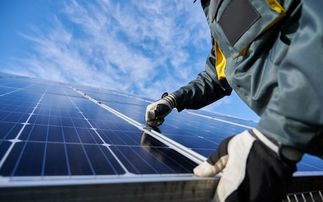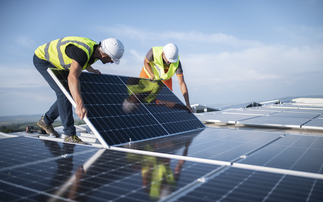United Utilities says £3.5m floating solar array will curb energy costs, helping to keep customers' water bills low
Construction has started on Europe's largest floating solar farm at United Utilities' Godley reservoir in Hyde, Greater Manchester.
The project will see 12,000 panels floating solar panels installed over an area of 45,500 square metres at a cost of £3.5m, delivering an expected 2.7GWh a year of renewable, zero carbon power that will be used directly on site.
United Utilities said the project was expected reduce its energy costs and as such would help to keep customers' water bills down.
The company also said it hoped to complete the installation before Christmas, avoiding the risk of it being impacted by cuts to solar subsidies that the government is planning for next year.
"We have a target to generate 35 per cent of our power requirements by 2020 and this project will make a significant contribution to that aim," said Chris Stubbs, head of renewable energy at United Utilities. "As part of United Utilities' energy strategy to generate more power we identified the Godley reservoir as a suitable site to install a floating solar array to provide the water treatment works with approximately 33 per cent of its energy requirements."
Advocates of floating solar arrays argue they can provide power onsite to water companies, while providing solar power without impacting on agricultural land. Moreover, the arrays tend to reduce evaporation from reservoirs, while the cooling effect of the water has been credited with improving the efficiency of solar cells.
The United Utilities array in Manchester will the second largest of its kind in the world, after a project in Japan, and the largest in Europe by some distance, dwarfing an 800 panel pilot project installed in Berkshire.
"While floating solar has been deployed elsewhere around the world, most notably in Japan, it is a new technology to the UK," said Stubbs. "Installations such as the Godley solar scheme will help us to keep energy costs and water customers' bills low."
The company told the Telegraph it was exploring plans for a second floating solar array in Lancashire and is in the process of installing around 100MW of solar capacity elsewhere on its sites, around 40MW of which will beat an anticipated deadline for steep cuts to solar feed-in tariff subsidies at the end of the year. The company said it was hopeful it would be able to build the full pipeline of projects, despite the subsidy cuts.
Solar industry insiders have warned the government's plans slash subsidies by around 83 per cent will have a devastating impact on the industry. But some firms have counselled that projects where the bulk of the solar power generated is used on site, reducing the need for grid power could still prove economic.







